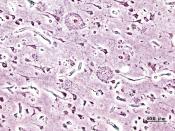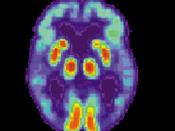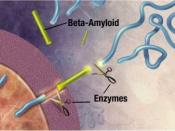'Where has Yesterday Gone'
Memory loss, like old age is a condition which mankind has always reluctantly recognized and always - with resignation. Memory loses are sometimes trivial and meaningless and go unrecognized. However, when these loses are so great that a person does not know who or where they are the concerns are quite grave. Although it is realize that Alzheimer's disease destroys the brain memory function, many do not realize precisely how the memory is destroyed once one is aware of the process, it becomes faster to work forward to alleviate the destruction.
'Without memory there is no knowledge to recreate or reproduce past perceptions, emotions, thoughts and actions that are so vital to live a full and functioning life. Memory is the key that unlocks doors that keep us functioning, not only mentally but physically (Corrick 32).'
'Memory loss is not a sign of decay (Freedman 10).'
As we get older, there is some mild impairment in our recollection of recent events, such as forgetting why one went into a room or misplacing a person's eye glasses, which even young are guilty of doing. As reported by Larry Squire, 'forgetting is quite normal and usually develops in the third decade of life, and by one estimate 85 percent of the healthy elderly - those over 65--suffer some memory impairment (59).'
According to Dr. Seligmann, 'forgetting is the process through which information in memory becomes inaccessible, either because it is stored but is not at that time retrievable (51).' This is one of the most important factors in forgetting. Memory loss is rapid at first and then gradually levels off. There are many types of 'dismembering' enemies that hamper ones recall and retrieval system. 'Forgetting may be increased by interference from proactive inhibition, that is material...


